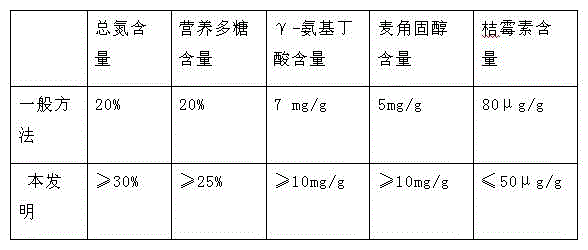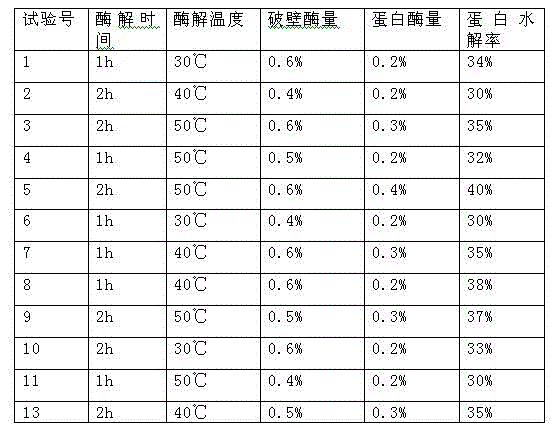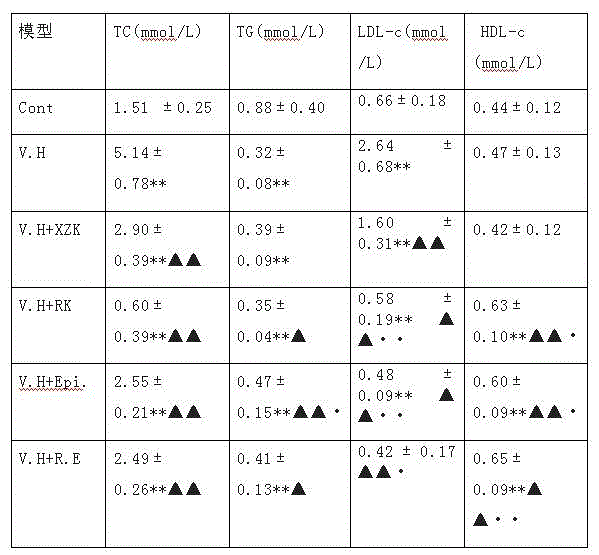Method for treating monascus residue
A technology of Monascus and Monascus mycelium, applied in the functions of food ingredients, medical raw materials derived from fungi, food preparation, etc., can solve the problems of secondary pollution, low purity, high impurity content, etc., and achieve the prevention of bone The effect of loose quality, high cracking rate and high purity
- Summary
- Abstract
- Description
- Claims
- Application Information
AI Technical Summary
Problems solved by technology
Method used
Image
Examples
Embodiment 1
[0035] A method for processing Monascus slag, the steps are as follows:
[0036] (1) Ultrasonic crushing step of Monascus mycelium
[0037] Pulverize the mycelium of Monascus koji through a 100-mesh sieve, soak in water, soak for 2-3 hours according to the ratio of solid to liquid in the mass-to-volume ratio of 1:10, and perform ultrasonic crushing. The ultrasonic power is 120-160W, and the treatment temperature is 30-50°C. Time 1-2h;
[0038] Described red yeast mycelium is prepared by following method:
[0039] After the rice and peptone are submerged with Monascus for 7 to 10 days, the liquid product fermented by Monascus is pressed out by a press, and then the red pigment is extracted with ethanol with a mass concentration of 60-70%. Monascus mycelium with red pigment, dried and stored at room temperature, wherein Monascus was preserved by the General Microorganism Center of China Committee for the Collection of Microorganisms, and the number was CGMCCNo.6807 Monascus s...
Embodiment 2
[0046] A method for processing Monascus slag, the steps are as follows:
[0047] (1) Ultrasonic crushing step of Monascus mycelium
[0048] Pulverize the mycelium of Monascus koji through a 100-mesh sieve, soak in water, soak for 2-3 hours according to the ratio of solid to liquid in the mass-to-volume ratio of 1:10, and perform ultrasonic crushing. The ultrasonic power is 120-160W, and the treatment temperature is 30-50°C. Time 1-2h;
[0049] Described red yeast mycelium is prepared by following method:
[0050] After the rice and peptone are submerged with Monascus for 7 to 10 days, the liquid product fermented by Monascus is pressed out by a press, and then the red pigment is extracted with ethanol with a mass concentration of 60-70%. Monascus mycelium with red pigment, dried and stored at room temperature, wherein Monascus was preserved by the General Microorganism Center of China Committee for the Collection of Microorganisms, and the number was CGMCCNo.6807 Monascus str...
PUM
 Login to View More
Login to View More Abstract
Description
Claims
Application Information
 Login to View More
Login to View More - R&D
- Intellectual Property
- Life Sciences
- Materials
- Tech Scout
- Unparalleled Data Quality
- Higher Quality Content
- 60% Fewer Hallucinations
Browse by: Latest US Patents, China's latest patents, Technical Efficacy Thesaurus, Application Domain, Technology Topic, Popular Technical Reports.
© 2025 PatSnap. All rights reserved.Legal|Privacy policy|Modern Slavery Act Transparency Statement|Sitemap|About US| Contact US: help@patsnap.com



